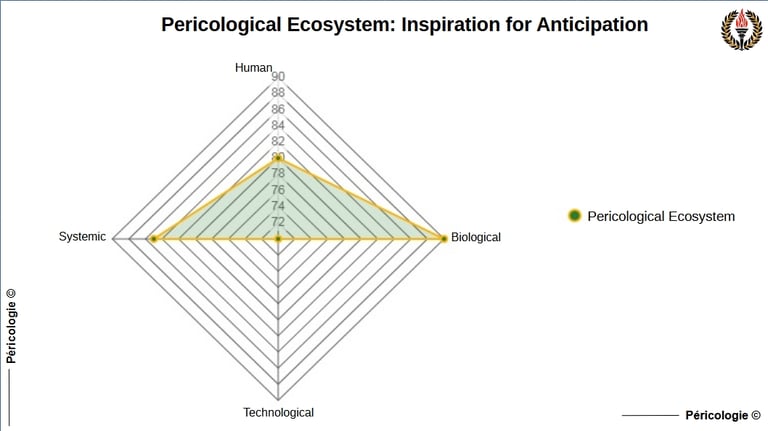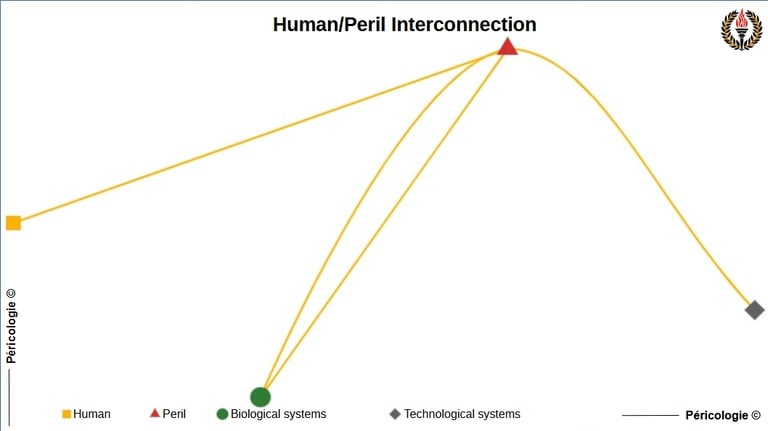Bio-Inspired Aspects of Pericology
Pericological Ecosystem
In the context of Pericology, an "ecosystem" refers to a dynamic set of interactions between living (human, animal, plant) and non-living (technological, environmental) entities within a given context, serving as a source of inspiration to anticipate and prevent systemic perils. It is not only a classical ecological concept, but a bio-inspired model of cooperation, self-management and feedback, applied to interconnected human, biological or technological systems. The ecosystem, in Pericology, is an observation matrix to detect warning signals of perils and design pragmatic preventive solutions, anchored in the collaborative dynamics of nature. It embodies the human/peril interconnection, where each component influences the overall balance, requiring peripheral vigilance to block dangers before their tipping point.


Pericological Ecosystem
Diagram of the pericological ecosystem
Pericological Example
Background : In an automated factory, a network of interconnected machines (sensors, robots, AI systems) forms a technological ecosystem. A weak signal (a sensor overheating) indicates a risk of cascading failure, threatening production.
Pericological Application : Inspired by the regulation of a forest ecosystem (where trees redistribute water to avoid water stress), Pericology applies a negative loop : an observer (monitoring system) detects overheating, an analyzer (algorithm) evaluates its potential impact, and an action (redistribution of the load to other machines) is implemented to prevent the breakdown. This avoids a tipping point (total shutdown) and maintains the balance of the system.
Etymology
The term ecosystem comes from the Greek oikos ("house", "habitat") and systēma ("organized whole", derived from syn- "with" and hístēmi "to place"). Appearing in 1935 in the work of Arthur Tansley, it initially referred to the interactions between organisms and their environment.
Pericological : From the Latin periculum ("danger, risk") and the Greek peri ("around").
Pericological Sources
https://youmatter.world/fr/definition/ecosysteme-definition-enjeux/
https://www.futura-sciences.com/planete/definitions/zoologie-pelagique-2367/
https://fr.wikipedia.org/wiki/Approche_%C3%A9cosyst%C3%A9mique
https://www.dictionnaire-environnement.com/ecosysteme_pelagique_ID4648.html
https://vitrinelinguistique.oqlf.gouv.qc.ca/fiche-gdt/fiche/8401121/ecosysteme
Human/Peril Interconnection
The "Human/Peril Interconnection" refers to the dynamic and reciprocal relationship between human actions, behaviors or decisions and systemic perils (biological, socio-cultural, technological or systemic). In Pericology, this concept emphasizes that humans are neither mere victims nor sole triggers of perils, but interconnected actors in feedback loops (positive or negative) that amplify or mitigate peril dynamics. It is inspired by the cooperative balances of natural ecosystems, where each element influences and is influenced by its environment. The Human/Peril Interconnection requires peripheral observation to detect weak signals and proactive action to prevent tipping points.


Human/Peril Interconnection
Human/Peril Interconnection Diagram
Pericological Example
Context : In a coastal farming community, weak signals (e.g., increased soil erosion, observed via local sensors) indicate an emerging peril linked to the interconnection between human activity (intensive overcropping) and an environmental imbalance (rising salt waters). Farmers, dependent on these lands, unwittingly amplify the peril through their practices, creating a positive loop (mutual aggravation of human-environmental factors).
Pericological Application : Drawing inspiration from bio-inspired dynamics (e.g., regulation of mangroves through resource redistribution), Pericology mobilizes Ecosynpraxy to observe (sensors measuring erosion), analyze (modeling of crop-saltwater interactions) and act (introduce salt-resistant crops and raise awareness among farmers about self-management). This breaks the positive loop, stabilizing the system before the tipping point (agricultural collapse).
Etymology
Interconnection : From the Latin inter ("between") and connexio ("link, relationship"), meaning a reciprocal relationship between elements.
Human : From the Latin humanus ("that which is proper to man"), here encompassing collective actions, decisions and impacts.
Peril : From the Latin periculum ("danger, ordeal"), central to Pericology to designate an emerging or established systemic threat.
Pericological Sources
https://en.wikipedia.org/wiki/Existential_risk_from_artificial_intelligence
https://www.sciencedirect.com/science/article/abs/pii/S001632871930357X
https://futureoflife.org/data/documents/Existential%20Risk%20Resources%20%282015-08-24%29.pdf
https://link.springer.com/article/10.1007/s11098-025-02301-3
https://link.springer.com/rwe/10.1007/978-3-319-31737-3_45-1
For enthusiasts
Our links
Message
© 2025. All rights reserved. By Pericology
